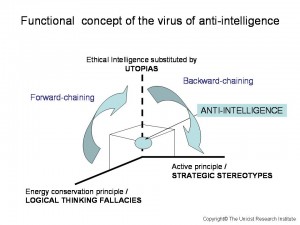Unicist Ontology of Social Viruses
Social viruses are the consequence of the use of anti-intelligence. Anti-intelligence is a virus. Anti-intelligence is the use of intelligence without ethical purposes. It substitutes ethical intelligence with an utopia (this utopia is homological with to proteins viruses use).
 The mutation of social viruses is produced by the functionality or dysfunctionality that the utopia poses in the environment. If the utopia can take advantage of the conditions of the environment there is no need to change. If it is dysfunctional, then utopias change and thus the complete structure of the social virus mutates.
The mutation of social viruses is produced by the functionality or dysfunctionality that the utopia poses in the environment. If the utopia can take advantage of the conditions of the environment there is no need to change. If it is dysfunctional, then utopias change and thus the complete structure of the social virus mutates.
Social viruses work as fallacious myths
Fallacious myths are beliefs built to create a parallel reality in order to sustain the hope of individuals, groups, institutions and cultures.
“People integrate based on their weaknesses and disintegrate based on their strengths.”
Fallacious myths avoid the perception of weaknesses and help to integrate the group where they work. They are built every time an individual bases his action on a minimum strategy, which implies beginning to use the energy conservation principle.
Fallacious myths are functional to the avoidance of assuming the responsibility of influencing an environment. Thus they have no purpose and work as viruses.
They need to be integrated with the necessary utopias to avoid perceiving the actual environment. Fallacious myths include a utopia and work as an absolute ideology that provides a fantasy of hope.
Request more information: n.i.brown@unicist.org
Peter Belohlavek
NOTE: The Unicist Research Institute is the major research organization in the world in its specialty based on more than 3,500 researches in complexity science, developed since 1976 until September 2010, applied to individual, institutional and social evolution. The applicative researches are based on the discovery of the Ontogenetic Intelligence of Nature and the consequent Unicist Theory of Evolution.